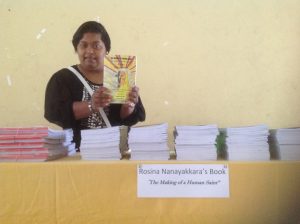
The Future of Special Needs in Sri Lanka
Thirty years ago parents with Special Needs children fought hard and painfully even to bring their child to a public function. Heads would turn, stares were the norm, ridicule was common and families faced it in silent pain. Sri Lankan society has progressed significantly over the years and now, these individuals with Special Needs are accepted quite often with compassion and care.
This in no way implies that the individual has won the respect and an independent voice in society. It is very rare that a Special Needs person would be given the same respect as any other Sri Lankan in our society. Compassion would be blended with condescension. Acceptance is conditional and place bound. Very often, they live on their own terms only in Special Worlds …”Our World” “ Our World of Colours” ( exhibitions and concerts of SNs persons)bear witness to this reality.
As parents become aware of institutes which offer care and skill development for these individuals with SNs they form groups and find solace and companionship among their own families. Families have started offering support for each other. This is a positive move with some limitations. There is the danger of the SNs individual moving only with individuals with SNs and not engaging with others in society. The group mentality can be a comfort zone in which adults hide themselves and thus prevent the young child from exposure to what is considered “normal’ in society. Resources provided for SNs persons with no proper information, guidance and education for the parents and the family may eventually leave the individual even more isolated as an adult.
Therefore it is our view that as resources for skill development and vocational training are offered to individuals with special needs their siblings and families should be “educated” to accept with respect the special needs person.
As the SNs persons get better care their life spans too improve. Companionship, friendship and social engagements for SNs young adults is an area which experts and social services need to address. This boomerangs into a new challenge for the families and society. Parents, very often the mother becomes a life- long care giver for these SNs individuals. With a prolonged life span what happens to them when they outlive their parents? Currently, Sri Lanka has very few residential “Homes” that can offer reliable services to elderly Special Needs individuals.
As Sri Lankan society has come of age to become conscious of the SNs child of school going age, the cause and plight of the young adults who are in their twenties and thirties, too, need to be addressed. It is the objective of LanakSpecialChild to initiate discussions on the above issues and encourage the creation of resources and designing of systems for meeting the growing and urgent needs of the Special Needs Individuals in our society.

The Rosina Nanayakkara Charitable Trust along with families of Special Needs Persons, their care takers, other interested individuals and institutes raise their voices on behalf of the Special Needs Persons and present the following:
- People with Down syndrome and other Special Needs can and do make meaningful contributions throughout their lives, whether in schools, workplaces, living in the community, public and political life, culture, media, recreation, leisure and sport.
Therefore
- They should be given equal opportunity to contribute to the community.
- Use their innate skills and abilities to contribute to society.
- Provide them with the opportunity to be employed in an appropriate and relevant field
- Make available to them the appropriate health facilities
- Make available to them a special clinic day, irrespective of age
- Give them the attention they need in the State health care facilities.
- Provide children with Special Needs appropriate educational instructions at least twice a week in every primary school
- Train primary school teachers to educate and develop the skills of the Special Needs persons in every educational region
- To begin with, identify one school in every region to have such a trained teacher
- Initiate a project where these SNs children are registered into the state school system
- Provide facilities for these SNs persons to have appropriate instructions two days a week in such primary schools.